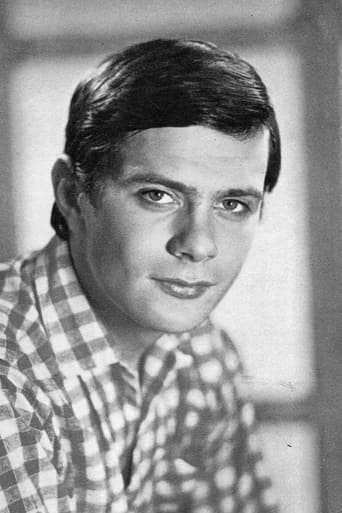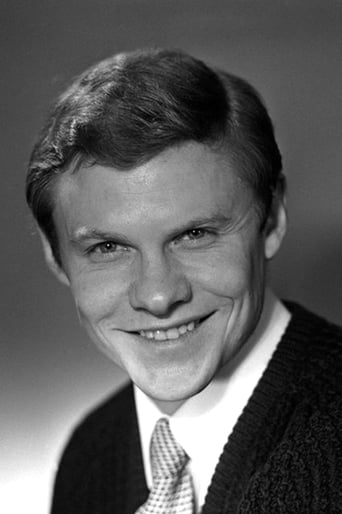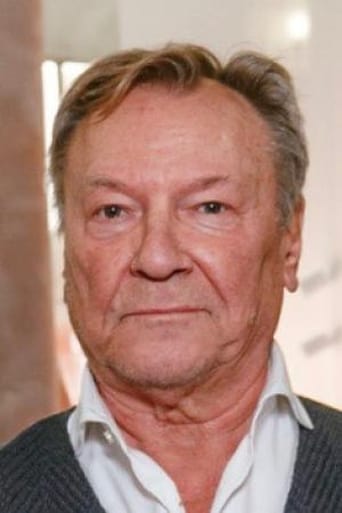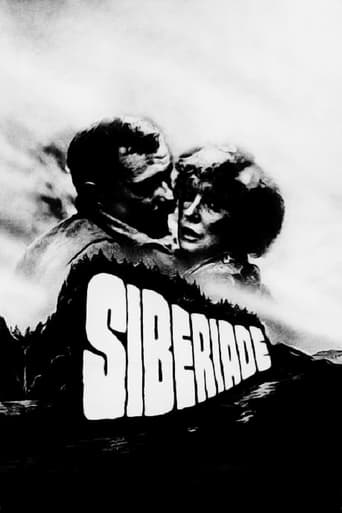
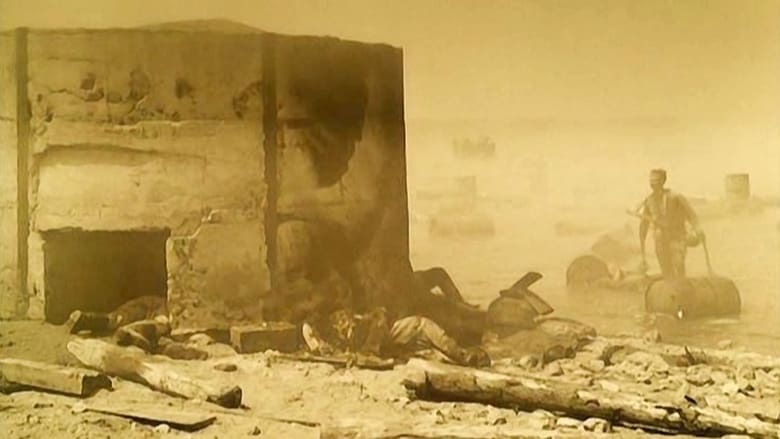
Siberiade (1979)
The story about a very small god-forgotten village in Siberia reflects the history of Russia from the beginning of the century till the early 1980s. Three generations try to find the land of happiness and to give it to the people. One builds the road through taiga to the star over horizon, the second 'build communism' and the third searches for oil.
Watch Trailer
Cast
Reviews
It's no definitive masterpiece but it's damn close.
In truth, there is barely enough story here to make a film.
I cannot think of one single thing that I would change about this film. The acting is incomparable, the directing deft, and the writing poignantly brilliant.
I wanted to like it more than I actually did... But much of the humor totally escaped me and I walked out only mildly impressed.
This film is probably a master piece. To summarize the history of Russia and the Soviet Union in some four odd hours is in itself a miracle. But what's more it concentrates on Siberia and it follows one little village, Elan, in this region, and in this village essentially three generations of the Ustyuzhanin family, in fact Afanasi, the grand father, then Nikolai the father and Aleksei the son, as opposed to the other family in the village, the Solomins. The first family are the poor ones, the underlings before the revolution, the others are the top family. The revolution of course transforms these relations and we follow the lives of these three men essentially in their village, when they are there since they are often rejected, or they just go away, and then they come back. Dramatically.Afanasi is the only one who does not come back. He is always there and lives alone with his son and no wife.Nikolai comes back as a Soviet officer, a Communist cadre and it is dramatic because he had been thrown away at the beginning of the revolution and his paramour, from the other family, had escaped from the village to find him and follow him. It will be a difficult situation since she will be burned to death by the white Cossacks during the civil war after the revolution. He comes back with his young son in the 1930s and is killed by the other paramour of his wife, the one she left behind. Aleksei is sent to an orphanage, then on one visit to the village and his relatives a recruiting unit at the very beginning of the war against Nazi Germany accepts his enlisting, though he is slightly too young, and he will be a hero in the war, saving his captain all by himself. But in the 1960s he comes back as a master driller to drill for oil in his village because he knows there is some: he discovered it with his father when he was a kid when they marched into the marsh known as the Devil's Mane and there oil was oozing out all over the place and they managed to set it on fire, accidentally. Aleksei though wants to leave after a while, with the woman he had taught how to dance when just under 18 before he enlisted, and it is when he finally can go and is going to go, alone because the woman refuses to follow him, he goes say goodbye to his drilling mates and it is then oil is struck and starts bursting out. But it gets on fire for some unimportant reason and the derrick falls and traps one man. All the others go and Nikolai manages the situation to save that man, but Nikolai is caught by the fire and dies.But the film is a lot more important than that. It is a real film about history. You cannot force history to do something it does not want to do because you have to work with people and people do not necessarily want to change and you have to convince them. It may take three generations to move from the superstition about the Devil's Mane to the acceptance that the village is going to be completely transformed by that oil, and the most dramatic war possible in the meantime after a very dramatic and heroic revolution.The film then shows how at the beginning of this political revolution Nikolai was naïve and thought it was easy to make people do what they did not want to do, and he is killed just because his rival in love refuses to follow him and kills him. It fails because of some private business and affair, a love story that had not gone the way one of the lovers wanted. Trite, and yet history is also the result of such capricious and unpredictable elements. It will take thirty years and one generation for what was then possible in the 1930s to become a reality in the 1960s.And in the 1960s we are no longer speaking of that kind of romantic revolution Nikolai had in mind. Aleksei and the other oil drillers around him are confronted to the stubborn desire of the central authorities in Moscow to develop the country and to decide in Moscow what is best for everyone and the small village and the country around is going to become the largest man-made sea with the largest hydroelectric dam and factory on the Volga. It is a pure miracle that makes oil burst out of its underground lair on the very same day, killing Aleksei, as the central committee of the Communist Party or some other bureaucratic authority like this one is meeting to take a decision in favor of the dam. The events stop the dam project in its shoes and in its trail. Unluckily, and Konchalovsky knew all about it in 1979, that was the last moment when history was right against the bureaucrats. After that the USSR entered a very dark time when bureaucracy was the only possible authority and initiative from people was discouraged and even choked, and stagnation started, leading finally to regression and the fall of the USSR. We feel that end the director could not know under the open discourse about the heroism of this Aleksei. [. . .] I must reckon it is not easy to find that film in DVD. I got the US edition in NTSC in Russian with English subtitles. But it was worth it.Dr Jacques COULARDEAU
This is one of the films I most regret having set my interest on to decide to watch it. Four and a half hours of a story running through several generations of a small Siberian village, which just can't be less interesting, moving and appealing no matter the point of view you want to look at it: epic, sentimental, historical, or all at once, which seems to have been the pretension of the director, failing completely and pitifully in his vain attempt. A loose thread of familiar and personal stories intermingled with historical events which are unable during more than four painful hours to drag your attention into them just for five minutes. Not a single character is developed in a way that you can feel any emotion or at least some interest in his/her whereabouts. But there is some epic in the film: the number of senseless, histrionic scenes which make you plead "please stop this once and for all!!!". The reason why I watched this film was that other film by director Konchalovsky is actually among my all time favorites: Runaway Train. After having watched Sibiriada now I wonder if they are the same person or I mixed up names or something.
Inexplicably this is compared to "Doctor Zhivago," I suppose because there are Russian revolutionaries. Egad. The films couldn't be more different.This is inspired by "2001." Equally inexplicably, "Solaris" is called the Russian 2001 because. Heck, because it has space hardware. Jees.The structure of "2001" is its reason to be, a fight among three narrative perspectives. We never know who wins: the human, machine or divine. Each is presented in a way that could be interpreted to subsume the others, and we are never grounded. Its sublime, each level above the other in a sort of Escher narrative.This is the same, very deliberately so. We have the same three: we have the human story of sex, love community and how that embraces everything, Miss Marplewise. We have the "machine" or the revolution and its apparatus, some figurative and some literal. And we have the mystical energy and laws of nature, which are deliberate, clear, pervasive here. (If there is something particularly skillful in this project cinematically, it is how this mystical mist pervades.)Its not at all as deft in the balance as Kubric's masterpiece. But you can see the three climbing over each other, and the standoff presented at the end.Its a long slog, and you'll have to wade through overly optimistic celebrations of revolutionary purpose. But its rewarding in a sort of Polish (meaning dreamy) way.On a second viewing, I have to remark on how the fundamental nature of this is different from most else that I watch. I'm particularly sensitive to the fact that most every element that I see in every film project is a matter of market forces. An artist can modulate within that pull, but never really escape the sender-receiver dynamic. This film differs in the way that some monumental architecture does from what surrounds it. In the soviet system, you pay your dues and prove that you are a worthy artist. That means of course that you have to satisfy the artistic bureaucracy, the nature of which one can only imagine. But once you achieve some level of power, you become a dilettante, with amazing reach. Everything we see here is because it was envisioned to be so, quite apart from what we normally have to deal with in the "free" world. Its the inversion that is striking. This film really is perfect in many ways. You can see that every frame and nuance is the way the filmmaker wants it regardless of whether he thinks people care. I didn't care much, because the thing is as soulless as most other Soviet art. But its very clean, and big and sentimental. And its different, and that's a welcome shower.Ted's Evaluation -- 3 of 3: Worth watching.
I was young film student in 1979 when the Union of the Soviet Filmmakers came to Sofia Bulgaria and premiered Konchalovsky's "Siberiade"; Tarkosvky's "Stalker" and Danelia'a "Autumn marathon". I was stunned by the cosmopolitan dimension of the art form. Then and only then, I saw "Siberiade" 4 and 1/2 hours epic and was speechless. Way better then Bertolucci's "1900". By far!Hope Andron will somehow get to the negative and make "director's restored version full lenght " someday! On DVD of course! Also I fiercely fought in defense of this Cinema against most of my colleagues who were equating Soviet film with bad taste! Time is on my side.
